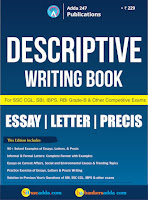Dear Aspirants,
As NABARD exam is approaching, you must practice and pay attention to all the subject and section to maximise your score in the final exam. Computer Knowledge section can help you to improve your overall score if in case other sections are tougher than the expectation. Solve or Answer these 15 Computer Knowledge Questions to test your preparation for NABARD Grade-A and other upcoming Bank Exams of 2018.
Q1. DBMS is a set of programs, which allows a DBA to:
(a) maintain a database
(b) connect to an application
(c) create an application
(d) create data
(e) None of these
Show Answer
S1. Ans.(a)
Sol. A Database Management System (DBMS) allows a database administrator to maintain a database, which includes various operations, such as creating a database, deleting it, creating tables, and updating records in the database tables.
Sol. A Database Management System (DBMS) allows a database administrator to maintain a database, which includes various operations, such as creating a database, deleting it, creating tables, and updating records in the database tables.
Q2. Which of the following is not a database type?
(a) Flat-file database
(b) Relational database
(c) Distributed database
(d) Simple database
(e) None of these
(a) Flat-file database
(b) Relational database
(c) Distributed database
(d) Simple database
(e) None of these
Show Answer
S2. Ans.(d)
Sol. Depending on the pattern in which data is stored, databases are classified into three types, namely flat-file database, relational database, and distributed database.
Sol. Depending on the pattern in which data is stored, databases are classified into three types, namely flat-file database, relational database, and distributed database.
Q3.IBM was provided software for PC DOS by which of the following company?
(a) Microsoft
(b) Sony
(c) Google
(d) Apple
(e) None of the above
(a) Microsoft
(b) Sony
(c) Google
(d) Apple
(e) None of the above
Show Answer
S3. Ans.(a)
Sol. Microsoft provided Operating System to IBM PC DOS.
Sol. Microsoft provided Operating System to IBM PC DOS.
Q4. Which of the following was used to program the first computer?
(a) Assembly language
(b) Machine language
(c) Source code
(d) Object code
(e) ASCII code
(a) Assembly language
(b) Machine language
(c) Source code
(d) Object code
(e) ASCII code
Show Answer
S4. Ans.(b)
Sol. Earliest computers used Machine language.
Sol. Earliest computers used Machine language.
Q5.Charles Babbage is known to have conceived which of the following earliest Computing machine?
(a) Analytical engine
(b) ENIAC
(c) UNIVAC
(d) All of the above
(e) None of the above
(a) Analytical engine
(b) ENIAC
(c) UNIVAC
(d) All of the above
(e) None of the above
Show Answer
S5. Ans.(a)
Sol. The Analytical Engine was a proposed mechanical general-purpose computer designed by English mathematician and computer pioneer Charles Babbage. It was first described in 1837 as the successor to Babbage’s difference engine, a design for a mechanical computer.
Sol. The Analytical Engine was a proposed mechanical general-purpose computer designed by English mathematician and computer pioneer Charles Babbage. It was first described in 1837 as the successor to Babbage’s difference engine, a design for a mechanical computer.
Q6.In second generation, which type of primary memory was used to store data?
(a) Paper tapes
(b) IC
(c) Magnetic core
(d) Magnetic tape
(e) Magnetic disk
(a) Paper tapes
(b) IC
(c) Magnetic core
(d) Magnetic tape
(e) Magnetic disk
Show Answer
S6. Ans.(c)
Sol. In second generation, magnetic cores were used as primary memory. In this generation assembly language and high-level programming languages like FORTRAN, COBOL were used.
Sol. In second generation, magnetic cores were used as primary memory. In this generation assembly language and high-level programming languages like FORTRAN, COBOL were used.
Q7. Which of the following entities is called a strong entity?
(a) Entity having foreign key
(b) Entity having primary key
(c) Entity having alternate key
(d) Entity having candidate key
(e) None of these
(a) Entity having foreign key
(b) Entity having primary key
(c) Entity having alternate key
(d) Entity having candidate key
(e) None of these
Show Answer
S7. Ans.(b)
Sol. An entity set containing a primary key is called a strong entity set. A strong entity set has key attributes.
Sol. An entity set containing a primary key is called a strong entity set. A strong entity set has key attributes.
Q8. Which of the following is not a type of SQL statement?
(a) Data manipulation language
(b) Data definition language
(c) Data standard language
(d) Data control language
(e) None of these
(a) Data manipulation language
(b) Data definition language
(c) Data standard language
(d) Data control language
(e) None of these
Show Answer
S8. Ans.(c)
Sol. Common categories of SQL statements include DML, DCL, DDL, TCL, etc. DDL statements are used to define a database structure, DML statements are used for the management of data within database objects and DCL statements are used for setting privileges to access data.
Sol. Common categories of SQL statements include DML, DCL, DDL, TCL, etc. DDL statements are used to define a database structure, DML statements are used for the management of data within database objects and DCL statements are used for setting privileges to access data.
Q9. Which of the following characteristics is used to compute dynamically the results from Excel data?
(a) Go to
(b) Table
(c) Chart
(d) Diagram
(e) Formula and Function
(a) Go to
(b) Table
(c) Chart
(d) Diagram
(e) Formula and Function
Show Answer
S9. Ans. (e)
Sol. Functions are predefined formulas and are already available in Excel. They are used to compute dynamically the results from Excel data
Sol. Functions are predefined formulas and are already available in Excel. They are used to compute dynamically the results from Excel data
Q10. =Sum (S3 : S10) is an example of a
(a) function
(b) formula
(c) cell address
(d) value
(e) None of these
(a) function
(b) formula
(c) cell address
(d) value
(e) None of these
Show Answer
S10. Ans. (b)
Sol. It is a formula to get sum of the data from cell number S3 to S10.
Sol. It is a formula to get sum of the data from cell number S3 to S10.
Q11. Which among the following is the short cut key for slideshow?
(a) F4
(b) F5
(c) F6
(d) F7
(e) None of these
(a) F4
(b) F5
(c) F6
(d) F7
(e) None of these
Show Answer
S11. Ans. (b)
Sol. F5 is the shortcut key for slideshow.
Sol. F5 is the shortcut key for slideshow.
Q12. To switch the slide orientation between portrait and landscape – Click __________ and select Portrait or Landscape as your requirement.
(a) Slide page
(b) Slide Orientation
(c) Slide theme
(d) Slide number
(e) None of these
(a) Slide page
(b) Slide Orientation
(c) Slide theme
(d) Slide number
(e) None of these
Show Answer
S12. Ans. (b)
Sol. You have to select slide orientation to change orientation.
Sol. You have to select slide orientation to change orientation.
Q13. An error in a computer program is called a _________.
(a) crash
(b) power failure
(c) bug
(d) virus
(e) fatal error
(a) crash
(b) power failure
(c) bug
(d) virus
(e) fatal error
Show Answer
S13. Ans. (c)
Sol. A software bug is an error, flaw, failure or fault in a computer program or system that causes it to produce an incorrect or unexpected result, or to behave in unintended ways.
Sol. A software bug is an error, flaw, failure or fault in a computer program or system that causes it to produce an incorrect or unexpected result, or to behave in unintended ways.
Q14. EBCDIC stands for?
(a) Extended Binary Coded Decimal Interchange Code
(b) Enlarged Binary Code Digital Interchange Code
(c) Extended Bilingual Coded Decimal Interchange Code
(d) Encoded Bilingual Coded Division Interchange Code
(e) None of the above is correct
(a) Extended Binary Coded Decimal Interchange Code
(b) Enlarged Binary Code Digital Interchange Code
(c) Extended Bilingual Coded Decimal Interchange Code
(d) Encoded Bilingual Coded Division Interchange Code
(e) None of the above is correct
Show Answer
S14. Ans. (a)
Sol. EBCDIC stands for Extended Binary Coded Decimal Interchange Code. It is a binary code for alphabetic and numeric characters that IBM developed for its larger operating systems.
Sol. EBCDIC stands for Extended Binary Coded Decimal Interchange Code. It is a binary code for alphabetic and numeric characters that IBM developed for its larger operating systems.
Q15. Which among the following was the first graphical web browser?
(a) Mosaic
(b) WAIS
(c) CERN
(d) Gopher
(e) None of the above
(a) Mosaic
(b) WAIS
(c) CERN
(d) Gopher
(e) None of the above
Show Answer
S15. Ans.(a)
Sol. The explosion in popularity of the Web was triggered by NCSA Mosaic, a graphical browser which eventually ran on several popular office and home computers. This was the first web browser aiming to bring multimedia content to non-technical users, and therefore included images and text on the same page, unlike previous browser designs, its founder was Marc Andreessen.
Sol. The explosion in popularity of the Web was triggered by NCSA Mosaic, a graphical browser which eventually ran on several popular office and home computers. This was the first web browser aiming to bring multimedia content to non-technical users, and therefore included images and text on the same page, unlike previous browser designs, its founder was Marc Andreessen.






 The Hindu Review October 2022: Download ...
The Hindu Review October 2022: Download ...
 Manjunath Belagavi's Success Story: Clea...
Manjunath Belagavi's Success Story: Clea...
 CWC Salary 2025, Job Profile, Perks and ...
CWC Salary 2025, Job Profile, Perks and ...





